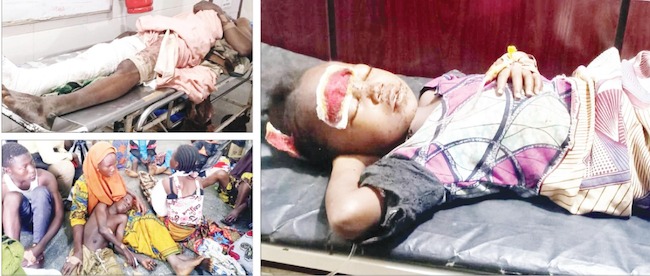
EVEN for a country accustomed to ceaseless bloodletting, the massacre of innocent civilians in Tudun Biri, Igabi Local Government Area, Kaduna State, in misdirected air strikes by the Nigerian Army on December 3, is heart-rending. The death toll had climbed to 87 persons by Thursday, with many of the victims being children. Unlike in the past, this tragedy must result in swift consequences for the perpetrators, a drastic overhaul of the rules of engagement by the security forces, and a resolute final offensive to wipe out banditry and terrorism in the country.
The disaster attracted global attention despite the distractions of the ongoing wars in the Middle-East, Ukraine, and Myanmar. While a formal investigation is about to be launched, what is known so far reveals gaps and lack of coordination in the anti-insurgency campaign.
More tellingly, it reminds Nigerians of the precariousness of the country where the full might of its military is deployed in operations across its entire breadth.
Reports said that scores of men, women, and children were gathered for a religious ceremony in Tudun Biri on that fateful day when death came hurtling from the sky. The missiles were fired from drones deployed by the Army, which has recently ramped up its weapons platforms with aerial assets, including drones and an ongoing rebooting of its aviation wing.
Survivors recounted scenes of horror. The community put the death toll at 127. Ibrahim Yakubu, 38, who lost his mother and two children, aged 10 and seven, described bodies of children “torn to pieces,” and of pregnant women felled. Aisha Haruna, 50, lost 13 relatives. Idris Dahiru, 37, claimed that 30 of his relatives perished.
While the Nigerian Air Force swiftly denied carrying out the air strikes, the Nigeria Army admitted responsibility two days later. Its spokesman, Onyema Nwachukwu, indicated that the crowd targeted had been mistaken for bandits.
Troops had reportedly been tracking a group of terrorists operating in the area and surrounding forests, with which they had exchanged gunfire earlier.“Then we got a signal that the bandits were planning to attend the procession to abduct people at the Maulud ground,” said one soldier. “The ground soldiers had surrounded the place but later called for air support when they could not get a hold of the terrorists.”
Faulty intelligence and faultier analysis were evident. Human Rights Watch cites the bombings as the latest in misdirected air strikes by Nigerian military forces targeting Islamic terrorists or bandits since 2017 that it said had killed about 300 persons. The PUNCH estimates a higher toll of 425 civilians killed in those accidental strikes.
In January 2017, NAF jets fired two bombs on Rann town, Borno State that harboured hundreds of internally displaced persons, killing 126 persons, including refugees and aid workers. In April 2020, 17 persons were killed in another NAF air strike in Sakatoku village, Damboa LGA, Borno, including women and children. The missiles landed far from the intended target of Boko Haram terrorists gathered 12 kilometres away in Korongilum village.
A year later, “friendly fire” from military aircraft killed several army troops who had called for air support for ground operations in Mainok, also in Borno. Two months later, several guests at a wedding in Genu, Rijau LGA, Niger State, were hit by aerial bombs meant for bandits. A woman and four of her children were killed in another NAF bombing meant for bandits in July 2021 in Sububu forest that straddles Shinkafi and Maradun LGAs in Zamfara State.
There are several more, including the killing of 13 residents in Kunkuna village, Safana LGA, Katsina State in July 2022, seven children killed in July 2022 in Nachade village, Maradi by NAF jets, and 30 vigilantes killed mistakenly in Galadima Kogo, Shiroro LGA, Niger State in January 2023.
Clearly, the Nigerian military has been careless in some of its air operations. The civilian authorities have also been remiss by failing to demand strict accountability and taking necessary disciplinary and administrative action against commanders responsible for the lapses, and the deaths and injuries of innocent civilians and troops.
Tinubu should be different. The probe of the Kaduna killings should be followed up with sanctions. Officers whose mistakes and misjudgements led to the tragedy must be held accountable in accordance with service regulations and global best practices.
Globally, when officers make such mistakes, they face disciplinary action, involving reprimand, demotion or worse.
More importantly, it brings home yet again, the need for a thorough review, reassessment and change in strategy in the security response to insurgency, terrorism, and banditry. In 14 years of confronting Islamist terrorism and insurgency fronted by BokoHaram, the group not only thrives but has birthed several spin-offs and spread from the North-East to other parts of the North.
Bandits, once mainly active in Zamfara, have grown in number to about 30,000 in that state and 120,000 across the North-West region, according to researchers at the Uthman Dan Fodio University, Sokoto. They now infest the North-Central region too, attack military bases, ambush troops and control territory. The Katsina State Government admits that they are active in 24 of its 34 LGAs; in Kaduna, Niger and Sokoto states, they virtually control some LGAs, imposing their authority and levies on villages and communities.
Over 100,000 persons have been killed by terrorists and bandits since 2010, according to estimates. In the eight years to May 2023, the Nigeria Security Tracker cited 63,111 persons killed by assorted criminals. Between July and October, the Sunday PUNCH estimated 521 persons killed by bandits, and terrorists in the country.
Strategies to defeat terrorists and bandits must therefore change. The vexed issue of coordination has reared its head in the latest episode. While officially, spokesmen for the various military branches are denying it, frontline personnel are constantly telling reporters and NGOs of lack of effective synergy among the services.
Tinubu as C-in-C should initiate sweeping reforms and prioritise coordination among the military branches and the intelligence services. There is also an urgent need to reform and reorganise the intelligence services as today’s security threats are radically different from 1989 when the last review was undertaken.
Beyond the probe and the promise to punish perpetrators, the Minister of Defence, Abubakar Badaru, must take responsibility. Henceforth, there should be stricter civilian oversight of the military. The arms-length approach that successive administrations have adopted towards the military should be stopped.
The International Humanitarian Law, “law of armed conflicts,” stipulates that parties to an armed conflict “must at all times distinguish between the civilian population and combatants and between civilian objects and military objectives and accordingly, shall direct their operations only against military objectives.”
Accidents do happen, but in other climes, those responsible for such grave operational errors are held accountable and measures adopted to avoid repeats. In October 2015, 16 American military personnel, including a general officer, were given administrative punishments for their roles in the accidental strike on the Doctors Without Borders hospital in Kunduz, Afghanistan.
Erring commanders in the Kaduna strike must also be held accountable.
As recommended by the US Africa Command, the Nigerian military should strongly adopt Artificial Intelligence and other modern technology tools to sharpen its precision strike capabilities and avoid misdirected strikes. Intelligence-gathering and application capabilities – human and electronic – of the military and civilian security agencies should be upgraded for efficiency.
Nigeria is in mourning and at a time like this, unity and cooperation are essential. But cynically, some Northern elite groups are, as usual, capitalising on others’ grief to deploy base religious, ethnic and regional sentiments for relevance and advantage. They should act more responsibly. They did not make the incendiary, divisive pronouncements they are bandying today when hundreds of civilians were killed in similar circumstances under the immediate past administration of Muhammadu Buhari.
Such politicisation of religion by the elite played a huge role in the birth and flourishing of terrorism and banditry for which the country is paying a terrible price.
Tinubu should remain focused. His tasks are clear and urgent; he needs to unravel the Kaduna tragedy, hand out disciplinary action, compensate and succour the afflicted, and reform the military and the intelligence apparatus.
Above all, he should harness all necessary resources to crush terrorism, insurgency, banditry, and random criminality once and for all.





